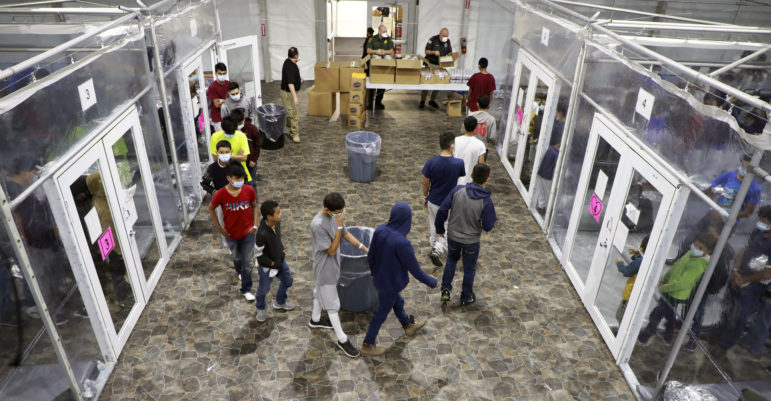
Photo by: Marc Fader
The prison nurseries at New York’s Taconic Correctional Facility and Bedford Hills Correctional Facility across the street are among the few such programs in the country.
It’s tough enough to find out you’re pregnant when you’re 16. On January 12, 2010, Isabella Crowell, who was 16, found out she was pregnant 15 minutes before Syracuse police placed her in handcuffs for a burglary.
Crowell arrived at Bedford Hills Correctional Facility for a one- to three-year sentence. At three weeks pregnant, she spent the first part of her incarceration in general population. “For a long time, I wasn’t going to keep my baby with me,” says Crowell. “I got into the whole, ‘I did the crime. My baby didn’t.'”
Officers persuaded Crowell to enlist in the prison nursery program offered at both Bedford and Taconic Correctional Facility in upstate New York, which are two out of the 13 such programs available nationwide. She transferred to Taconic at eight-and–a-half months pregnant, remaining in general population until being placed in Taconic’s prison nursery two weeks before giving birth. Crowell welcomed her son on September 5, 2010.
Prison nurseries allow mothers the opportunity to give birth and form an intimate relationship with their infant during the most critical stages of childhood development.
In New York, the nurseries are open to mothers in jail for non-violent crimes. Mothers are housed in a special unit separate from general population and provided with all child-rearing necessities: formula, breast-feeding help, diapers, baby clothing, medical care, toys and more. Babies can stay with their mothers from 30 days to up to three years at some prisons. Mothers must attend substance abuse programs and take pre- and post-natal classes, addressing any addictions that put them in prison while learning how to improve their parenting skills simultaneously.
Advocates support prison nurseries and the resulting relationship formed between mother and child. “Babies born into prison nursery programs are permitted the time and space to form close bonds with their mothers, so they do not suffer from attachment disorders or other developmental and emotional milestones,” according to the Mothers Behind Bars report by The Rebecca Project For Human Rights in October 2010.
Amy Stone, a former mother at Bedford’s prison nursery, can attest to attachment disorders experienced by children with mothers behind bars. Imprisoned when her first child, Lindsay, was 15 months, Stone spent 16 months in Nassau County Jail. Lindsay, who is now 11-years-old and lives with her grandparents, takes her anger out on Stone during their twice a month visits.
“Usually, something will happen that will trigger an event in the house where, like in the past, she’s had tantrums,” Stone explains. “[She’ll] just be like ‘well you aren’t my mother anyway. I’m not going to listen to you.’ And there’s other times where she’ll push me away… she’ll just say ‘get away from me. I don’t want to talk to you.'”
Lindsay asks her mother why she was not there to raise her but Stone never wants to discuss being in prison because of substance abuse.
While prison nurseries have many proponents, critics, including some prison-bound mothers, say prison is simply not an environment for children. The Reagan-era crackdown on drug crimes brought women to prison in huge numbers. Since then, the country’s female prison population has increased 400 percent, exceeding the growth for males.
“Critics of these parenting programs argue that prison is not an appropriate environment for children and that living in prison may have harmful effects on the child later in life,” according to the Mothers, Infants, and Imprisonment report by the Institute on Women and Criminal Justice.
Stone rejects such statements. “They say the children don’t adjust well. That’s a lie. My son’s been in school since he came home… he’s in kindergarten now. He’s reading. He’s able to add most of his basic numbers.”
Stone gave birth to her son Jacob in April 2005 at Bedford Hills after being transferred from Riker’s Island. At the time of her arrest in August 2004, she rotated between cocaine, alcohol and marijuana daily. “My son would have been born addicted to something if I hadn’t been arrested,” says Stone.
But while the prison program helped Stone, she had trouble when she was released and had to balance her substance-abuse treatment with life’s other demands.
“The funny thing about addiction is it doesn’t matter how much you love your child. It doesn’t matter how much you want to do good,” says Stone. “The addiction has this force that if you don’t address what the issues are surrounding the addiction, you’re always going to go back to it.”
Unable to address the drugs and the guilt felt from abandoning her daughter for her street lifestyle years ago, Stone relapsed while living in the transitional housing program at Hour Children after her release from Bedford. “I said to another girl ‘could you watch my son I’m going up the block to get some chicken. I’ll be back in 20 minutes.’ And I never came back. Five days later was when I decided I would come back.”
Shortly after her return, Stone’s best friend asked her to enter a substance abuse program and offered to watch her son in the meantime. Stone refused the idea until a sister at Hour Children approached her, suggesting that an abuse program may change her life. Stone’s parole officer placed her in some programs.
The root of Stone’s abuse lay in her relationship with her first daughter. “From using and getting locked up, leaving her in a home when she was like a baby sleeping in a crib, getting in car accidents under the influence while she was in the car. All those things that I never addressed… led me right back to abusing.”
Sister Teresa Fitzgerald witnessed both successful efforts and relapse stories among prison nursery mothers through her re-entry organization Hour Children. A strong advocate of the prison nursery program, Sister Tesa, as she’s known by program mothers and co-workers, acknowledges the potential of every woman to turn their life around for their child.
“When you’re in prison, you’re drug free and you’re looking at a child in a whole other way,” says Sister Tesa. “Your life on the street was really just your life on the street.” If she had her way every imprisoned mother would be allowed into the nursery program, unless their criminal history poses a threat to the nursery residents.
Sister Tesa believes that the prison nursery is strong in helping the mothers heal their past issues with abuse.
“When my baby was born, I couldn’t let him go. I needed him,” explains Crowell. “I think the women that go to jail pregnant, that’s what saves a lot of them.”
It’s no magic bullet, however. Crowell relapsed while staying at Hour Children after her December 2010 release from Taconic. “I didn’t know what to do with my freedom,” she says. Sister Tesa and other volunteers mentored Crowell but she didn’t follow their advice. After a drug test given by her parole officer, Crowell begged for a second chance in order to stay with her son. In February she declared: “I’ve been clean going on four weeks now.”








